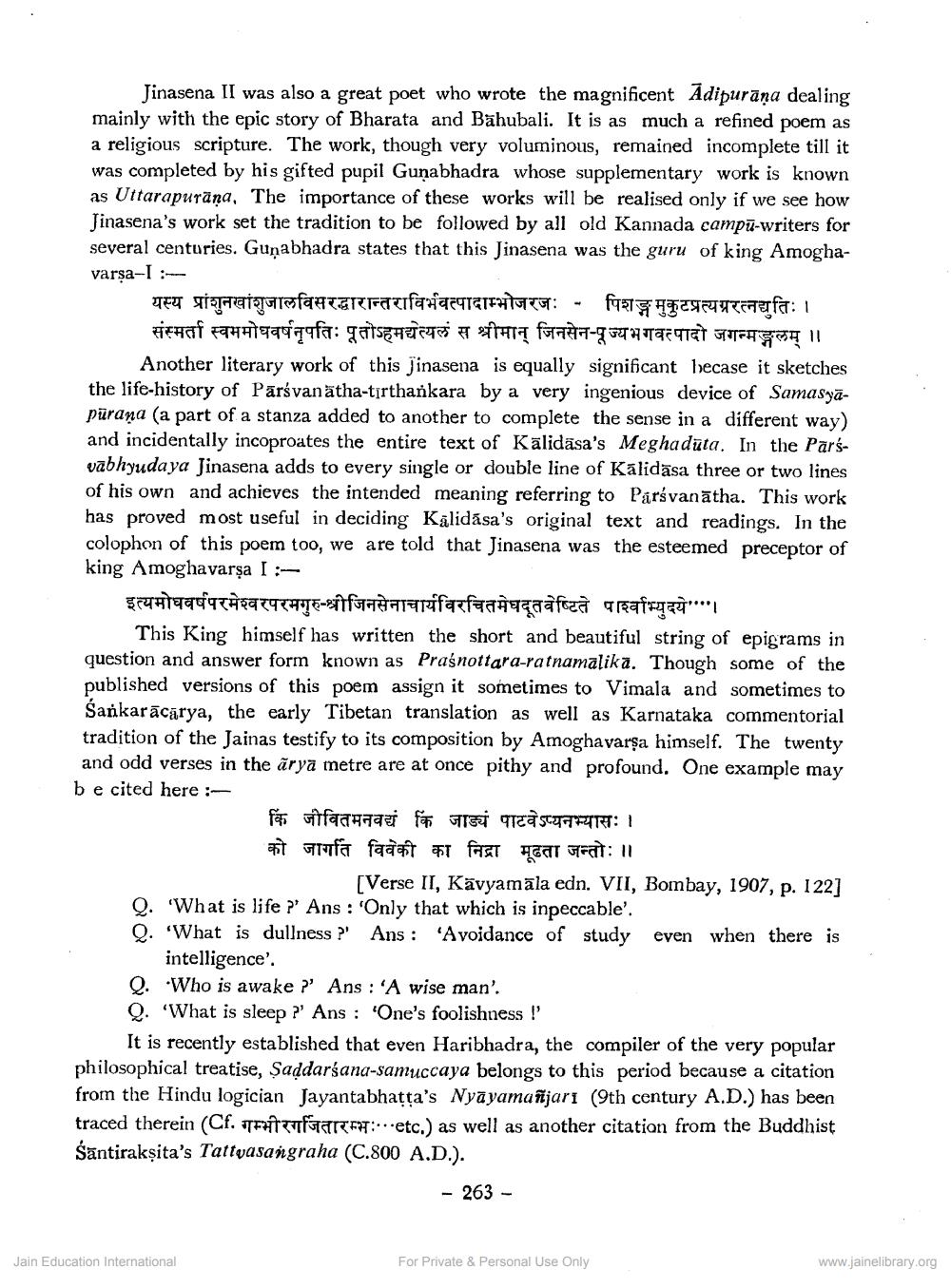Book Title: Contribution of Karnataka to Jain Literature and Culture Author(s): K Krishnamoorthy Publisher: Z_Kailashchandra_Shastri_Abhinandan_Granth_012048.pdf View full book textPage 7
________________ Jinasena II was also a great poet who wrote the magnificent Adipurāna dealing mainly with the epic story of Bharata and Bahubali. It is as much a refined poem as a religious scripture. The work, though very voluminous, remained incomplete till it was completed by his gifted pupil Gunabhadra whose supplementary work is known as Uttarapuräna, The importance of these works will be realised only if we see how Jinasena's work set the tradition to be followed by all old Kannada campū-writers for several centuries. Gunabhadra states that this Jinasena was the guru of king Amoghavarşa-I : यस्य प्रांशुनखांशुजालविसरद्धारान्तराविर्भवत्पादाम्भोजरजः - पिशङ्ग मुकुटप्रत्यग्ररत्नद्यतिः । संस्मर्ता स्वममोघवर्षनृपतिः पूतोऽहमोत्यलं स श्रीमान् जिनसेन-पूज्यभगवत्पादो जगन्मङ्गलम् ।। Another literary work of this jinasena is equally significant becase it sketches the life-history of Pārsvanātha-tįrthankara by a very ingenious device of Samasyapürana (a part of a stanza added to another to complete the sense in a different way) and incidentally incoproates the entire text of Kālidāsa's Meghaduta. In the Parsvabhyudaya Jinasena adds to every single or double line of Kālidāsa three or two lines of his own and achieves the intended meaning referring to Pärávanātha. This work has proved most useful in deciding Kalidasa's original text and readings. In the colophon of this poem too, we are told that Jinasena was the esteemed preceptor of king Amoghavarşa I : इत्यमोघवर्षपरमेश्वरपरमगुरु-श्रीजिनसेनाचार्यविरचितमेघदूतवेष्टिते पाश्र्वाभ्युदये। This King himself has written the short and beautiful string of epigrams in question and answer form known as Prašnottara-ratnamalika. Though some of the published versions of this poem assign it sometimes to Vimala and sometimes to Sankarācārya, the early Tibetan translation as well as Karnataka commentorial tradition of the Jainas testify to its composition by Amoghavarșa himself. The twenty and odd verses in the āryā metre are at once pithy and profound. One example may be cited here : कि जीवितमनवयं कि जाड्यं पाटवेऽप्यनभ्यासः । को जाति विवेकी का निद्रा मूढता जन्तोः ॥ [Verse II, Kävyamāla edn. VII, Bombay, 1907, p. 122] Q. What is life ?' Ans : 'Only that which is inpeccable'. Q. What is dullness?' Ans: 'Avoidance of study even when there is intelligence'. Q. Who is awake ? Ans: 'A wise man'. Q. What is sleep ?' Ans : 'One's foolishness ! It is recently established that even Haribhadra, the compiler of the very popular philosophical treatise, Şaddarśana-samuccaya belongs to this period because a citation from the Hindu logician Jayantabhatta's Nyāyamañjarı (9th century A.D.) has been traced therein (Cf. tittfarten etc.) as well as another citation from the Buddhist śāntirakṣita's Tattvasangraha (C.800 A.D.). - 263 - Jain Education International For Private & Personal Use Only www.jainelibrary.orgPage Navigation
1 ... 5 6 7 8 9 10 11
